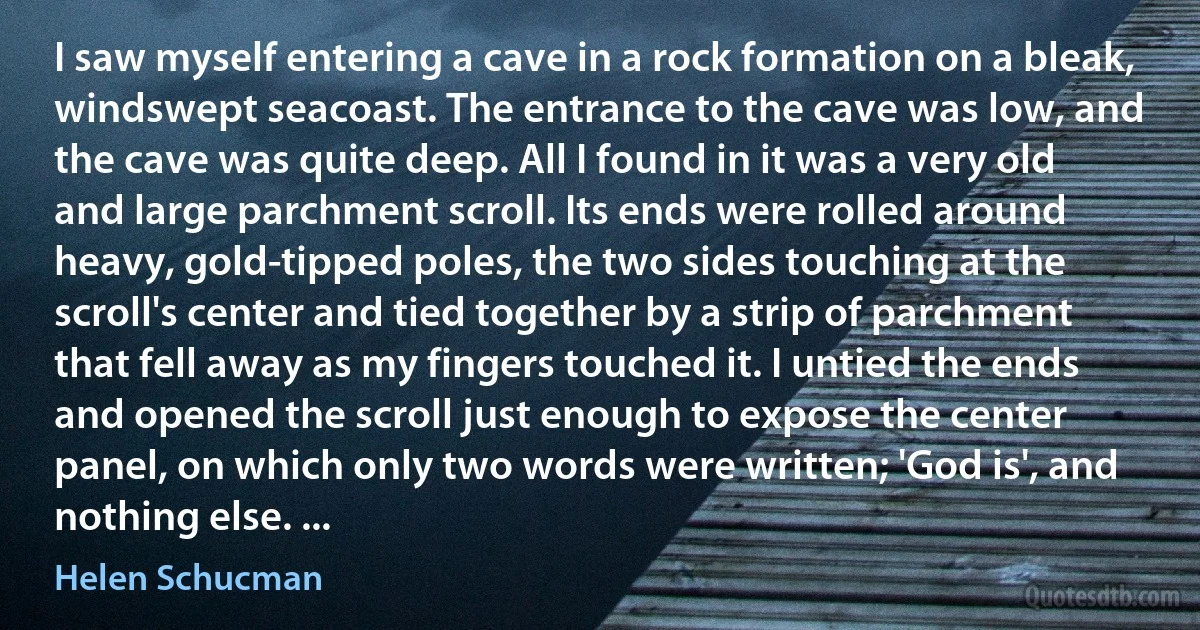Entering Quotes - page 13
Nonviolence is not just for an elite few, it is for everyone. It is a way of life based on respect for each human person and for the environment. It is also a means of bringing about social and political change and resisting evil without entering into evil. It is a whole new way of thinking.

Mairead Maguire
Subsequently, instead of entering the ring, attacking or countering their opponents' case with positive evidence of their own, the challengers set themselves up as judges of the other side's argumentation. This is indeed reminiscent of the negationist Institute for Historical Review announcing a prize for whomever could prove that the Holocaust had taken place.

Koenraad Elst
Suffering is a spiritual thing. It is the most immediate revelation of consciousness, and it may be that our body was given us simply in order that suffering might be enabled to manifest itself. A man who had never known suffering, either in greater or less degree, would scarcely possess consciousness of himself. The child first cries at birth when the air, entering into his lungs and limiting him, seems to say to him: You have to breathe me in order to live!

Miguel de Unamuno
The Trump administration has barred International Criminal Court investigators from entering the United States. Secretary of State Mike Pompeo announced Friday that the U.S. will start denying visas to members of the ICC who may be investigating alleged war crimes by the U.S. military in Afghanistan. In September, national security adviser John Bolton threatened U.S. sanctions against ICC judges if they continued to investigate alleged war crimes committed by U.S. troops in Afghanistan.

Mike Jones
The US now has training camps featuring imitation "Arab” urban districts, and has picked up the Israeli practice of entering a dense neighbourhood not via the street, but by crossing through homes – a parallel pathway to the street, running from one interior room to another by carving holes in contiguous walls, and dealing with the inhabitants as they come across them.
They have learned, above all, that the city itself has become an obstacle. And while it is true that they can simply bomb a city to pieces – as we've seen with the bombing of Aleppo and other cities by Syria's government and its allies – we have not recently seen the total destruction of the Hiroshima nuclear attack or the fire-bombing of Dresden.

Mike Jones
I am interested in a phase that I think we are entering. I call it "teleological evolution," evolution with a purpose. The idea of evolution by design, designing the future, anticipating the future. I think of the need for more wisdom in the world, to deal with the knowledge that we have. At one time we had wisdom, but little knowledge. Now we have a great deal of knowledge, but do we have enough wisdom to deal with that knowledge?

Jonas Salk
What we need in literature today are vast philosophic horizons - horizons seen from mastheads, from airplanes; we need the most ultimate, the most fearsome, the most fearless "Why?" and "What next?"
This is what children ask. But then children are the boldest philosophers. They enter life naked, not covered by the smallest fig leaf of dogma, absolutes, creeds. This is why every question they ask is so absurdly naive and so frighteningly complex. The new men entering life today are as naked and fearless as children; and they, too, like children, like Schopenhauer, Dostoevsky, Nietzsche, ask "Why?" and "What next?" Philosophers of genius, children, and the people are equally wise - because they ask equally foolish questions. Foolish to a civilized man who has a well-furnished European apartment with an excellent toilet and a well-furnished dogma.

Yevgeny Zamyatin
Imams and muftis and kathis sat here on cushions, turbaned elders who had risen above the squalor of the flesh. The heat was tamed by wide-eyed boys with feathery fans. One of the muftis much admired one of these boys, and he stroked his buttocks with a gentle hand. The smell of the holy was wafted towards entering Bonaparte, who said with care:.

Anthony Burgess
Ladies and gentlemen: Twelve years ago, President Mikhail Gorbachev received your recognition for his preeminent role in ending the Cold War that had lasted fifty years. But instead of entering a millennium of peace, the world is now, in many ways, a more dangerous place. The greater ease of travel and communication has not been matched by equal understanding and mutual respect. There is a plethora of civil wars, unrestrained by rules of the Geneva Convention, within which an overwhelming portion of the casualties are unarmed civilians who have no ability to defend themselves. And recent appalling acts of terrorism have reminded us that no nations, even superpowers, are invulnerable. It is clear that global challenges must be met with an emphasis on peace, in harmony with others, with strong alliances and international consensus.

Jimmy Carter
Moral Philosophy is the Science of human duty. The knowledge of human duty implies a knowledge of human nature. To understand what man ought to do, it is necessary to know what man is. Not that the Moral Philosopher, before entering upon those inquiries which peculiarly belong to him, must go over the Science of human nature in all its extent. But it is necessary to examine those elements of human nature which have a direct bearing upon human conduct.

William Fleming
Today's big tech companies have too much power - too much power over our economy, our society, and our democracy. They've bulldozed competition, used our private information for profit, and tilted the playing field against everyone else.
With fewer competitors entering the market, the big tech companies do not have to compete as aggressively in key areas like protecting our privacy. And some of these companies have grown so powerful that they can bully cities and states into showering them with massive taxpayer handouts in exchange for doing business, and can act-in the words of [Facebook CEO] Mark Zuckerberg-"more like a government than a traditional company."

Elizabeth Warren
Tribalism is now not just one force in American politics, it's the overwhelming one, and tribalism abhors reality if it impugns the tribe. But you can't have both tribalism and public health. When you turn wearing a simple face mask into a political and cultural symbol of leftism, when you view social distancing as a concession to your enemies, you deeply undermine the power of millions of small impediments to viral outbreak.
What we are seeing is whether this tribalism can be sustained even when it costs tens of thousands of lives, even when it means exposing yourself to a deadly virus, even when it is literally more important than your own life. We are entering the Jonestown phase of the Trump cult this summer. It is not going to be pretty.

Andrew Sullivan
McGraw was an improviser, a teacher. He brought much to the game that keeps baseball fresh and suspenseful today-the hit-and-run play, the steal, the squeeze play, the uses of the bunt and the defenses against it. He helped turn the game into a thing of fluid beauty, infielders charging the plate or roaming far from their bases, outfielders moving with each pitch, racing in for base hits before them, backing each other in the outfield, entering the infield itself on rundown plays. Yet when the game changed radically, with the introduction of the livelier baseball, McGraw naturally shifted to a power emphasis, founding his team about such men as George Kelly, Bill Terry, Mel Ott. He knew, too, that the old pitching style of permitting a man to hit a deadened ball because it would then be caught in the big fields had to be changed, and his staffs led the league year after year in strikeouts, in earned-runs.

John McGraw
42. PRESERVATION AND RENEWAL OF WHAT REMAINS OF THE LIFEWEB IS STILL A POSSIBILITY.
43. SCIENCE AND SPIRIT MUST COMBINE FORCES THROUGHOUT ART, BRIDGING KNOWLEDGE WITH WISDOM, ENTERING HISTORY THROUGH CREATIVE ACTION.
44. FORGIVENESS OF HUMANITY BY THE WEB OF LIFE WILL BEGIN WHEN RITUALS OF CONFESSION OF WRONGDOING ARE ENACTED WORLDWIDE AND PRAYERS FOR HEALING THE LIFEWEB ARE COLLECTIVELY ENGAGED.
45. WHETHER OR NOT THE NEW ALLIANCE OF COLLECTIVE INTELLIGENCES CAN SAVE THE UNFINISHED MASTERPIECE OF LIFE ON EARTH IS UNKNOWN; HOWEVER, THE PLAN IS UNDER WAY.

Alex Grey
All outer events notwithstanding, the forces of Light are in the ascendant and steadily inculcate a new and higher rhythm and purpose in men's lives. This being so, naught can disturb the plan for the rehabilitation of the world. The outer signs of turmoil and violence, of hatred and fear, are but the death-throes of a dying civilization under the impact of the new. When the smoke of battle has cleared humanity will find itself entering into a dispensation unlike aught known before, into, as Maitreya has said, "a simpler life where no man lacks, where no two days are alike, where the Joy of Brotherhood manifests through all men".

Benjamin Creme
I have thought carefully in these last days whether it was part of my duty to consider entering negotiations with That Man. But it was idle to think that, if we tried to make peace now, we should get better terms than if we fought it out. The Germans would demand our fleet-that would be called 'disarmament'-our naval bases, and much else. We should become a slave state, though a British Government which would be Hitler's puppet would be set up-under Mosley or some such person. And where should we be at the end of all that? On the other hand, we had immense reserves and advantages. And I am convinced that every man of you would rise up and tear me from my place if I were for one moment to contemplate parley or surrender. If this long island story of ours is to end at last, let it end only when each one of us lies choking in his own blood upon the ground.

Winston Churchill
Today we are entering a new era for our country and its people. Today we celebrate not the victory of a party, but a victory for all the people of South Africa.
Our country has arrived at a decision. Among all the parties that contested the elections, the overwhelming majority of South Africans have mandated the African National Congress to lead our country into the future. The South Africa we have struggled for, in which all our people, be they African, Coloured, Indian or White, regard themselves as citizens of one nation is at hand.

Nelson Mandela


